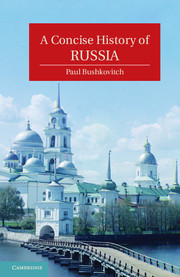Book contents
- Frontmatter
- Contents
- List of Figures
- Abbreviations
- Acknowledgments
- Prologue
- 1 Russia before Russia
- 2 Moscow, Novgorod, Lithuania, and the Mongols
- 3 The Emergence of Russia
- 4 Consolidation and Revolt
- 5 Peter the Great
- 6 Two Empresses
- 7 Catherine the Great
- 8 Russia in the Age of Revolution
- 9 The Pinnacle of Autocracy
- 10 Culture and Autocracy
- 11 The Era of the Great Reforms
- 12 From Serfdom to Nascent Capitalism
- 13 The Golden Age of Russian Culture
- 14 Russia as an Empire
- 15 Autocracy in Decline
- 16 War and Revolution
- 17 Compromise and Preparation
- 18 Revolutions in Russian Culture
- 19 Building Utopia
- 20 War
- 21 Growth, Consolidation, and Stagnation
- 22 Soviet Culture
- 23 The Cold War
- Epilogue
- Further Reading
- Index
22 - Soviet Culture
Published online by Cambridge University Press: 05 June 2012
- Frontmatter
- Contents
- List of Figures
- Abbreviations
- Acknowledgments
- Prologue
- 1 Russia before Russia
- 2 Moscow, Novgorod, Lithuania, and the Mongols
- 3 The Emergence of Russia
- 4 Consolidation and Revolt
- 5 Peter the Great
- 6 Two Empresses
- 7 Catherine the Great
- 8 Russia in the Age of Revolution
- 9 The Pinnacle of Autocracy
- 10 Culture and Autocracy
- 11 The Era of the Great Reforms
- 12 From Serfdom to Nascent Capitalism
- 13 The Golden Age of Russian Culture
- 14 Russia as an Empire
- 15 Autocracy in Decline
- 16 War and Revolution
- 17 Compromise and Preparation
- 18 Revolutions in Russian Culture
- 19 Building Utopia
- 20 War
- 21 Growth, Consolidation, and Stagnation
- 22 Soviet Culture
- 23 The Cold War
- Epilogue
- Further Reading
- Index
Summary
With the end of NEP and well before the war, the Soviet Union entered a new period of its history, with profound cultural implications. The first phase of that new period, from about 1928 to 1932, saw major upheavals in every area of culture, science, art, literature, and the humanistic disciplines. It was a “cultural revolution” in the phrase of the time, though one neither so deep or thorough as the much later Chinese events that borrowed the name. For the people involved, it was certainly traumatic, for it was not merely a new ideological campaign. In those years the party authorities carried out a systematic attack on the leaders of virtually every field of culture, accusing them of failure to live up to the demands of “socialist construction” and of harboring old-regime views and hostility to the new order. These attacks came in the press and in meetings held in various institutions and workplaces, where mostly young and enthusiastic Communists were encouraged to attack their elders and teachers in the name of the revolution. In addition, the OGPU carried out systematic arrests of leading intellectuals – historians, engineers, writers, and some scientists. Most were accused of participation in various, presumably mythical, underground organizations aimed at undermining or overthrowing Soviet power. Compared to later times, the treatment was relatively mild: some were executed, more went to prison camps, but many were simply exiled to provincial towns to teach or work in local institutions. Some professions suffered more than others: the scientists were less commonly victims, but even for them there were consequences. At the same time as the old authorities were removed, all sorts of radical super-Marxist notions achieved brief fame and dominance, along with the ideas of various cranks who presented themselves as new proletarian voices.
For the writers this period meant the virtual monopoly of the Proletarians connected with the Russian Association of Proletarian Writers (RAPP in Russian) and their leader, the critic Leopold Averbakh. The Proletarians assailed nearly all of the major writers of the 1920s as counter-revolutionary, particularly those from the pre-revolutionary intelligentsia and the “fellow travelers.” Many major writers, including Evgenii Zamiatin and Mikhail Bulgakov, were the objects of furious attacks. Zamiatin was allowed to leave the country, but Bulgakov was not and for a while had almost no possibility to work. Other writers like the poets Akhmatova and Pasternak, escaped attacks because they published little or nothing during those years. The Proletarians were almost as savage with Communist writers who did not toe Averbakh's line. What the Proletarians wanted was a literature that engaged itself in the struggle for the building of socialism, and in this sense some of their productions were quite critical of bureaucratism and passivity in the party and the state. Their ideal novel featured heroic workers overcoming tremendous obstacles to construct a new town or collectivize a village, changing themselves in the process. In reality, these stories were rarely successful, and the only readable works to come out of the movement were about the Civil War and were mostly written before 1929. The best by far was Mikhail Sholokhov's Quiet Don, and the RAPP leaders were uncomfortable with this volume.
- Type
- Chapter
- Information
- A Concise History of Russia , pp. 413 - 428Publisher: Cambridge University PressPrint publication year: 2011



